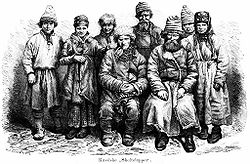Loading AI tools
Sami ethnic group From Wikipedia, the free encyclopedia
The Skolt Sámi or Skolts are a Sami ethnic group. They currently live in and around the villages of Sevettijärvi, Keväjärvi, Nellim in the municipality of Inari, at several places in the Murmansk Oblast and in the village of Neiden in Sør-Varanger Municipality. The Skolts are considered to be the indigenous people of the borderland area between present-day Finland, Russia and Norway, i.e. on the Kola Peninsula and the adjacent Fenno-Scandinavian mainland. They belong to the eastern group of Sámi on account of their language and traditions, and are traditionally Orthodox rather than Lutheran Christians like most Sami and Finns.
Säʹmmla Nuõrttsääʹm | |
|---|---|
 Drawing of Russian Skolt Sami from 1871 | |
| Total population | |
| c. 1,250 | |
| Regions with significant populations | |
| 500[1]–700[2] | |
| 250[3]–400[1] | |
| 150[3] | |
| Languages | |
| Skolt Sami, Finnish, Russian and Norwegian | |
| Religion | |
| Eastern Orthodox majority Lutheran minority | |
| Related ethnic groups | |
| Other Sámi | |
In 2024, media told about a leader of an NGO - saying that the phrase "Eastern Sami" should not be used about her people, Skolts.[4]

As a result of the Treaty of Tartu (1920), the Skolt homeland was split in two: the western part, Petsamo, became part of Finland and the eastern part became part of the Soviet Union. The border became a threat to the identity of the Skolts as it grew difficult for them to live as they traditionally had with reindeer husbandry, hunting and fishing as the source of their livelihood. Many Finnish immigrants moved back to their traditional Skolt homeland. In 1926, one-quarter of Petsamo's population were Skolts, and in 1930 the proportion dropped to one-sixth.[7]
After the Winter War (1939), Finland lost its portion of the Rybachiy Peninsula to the Soviet Union and after the Continuation War (1941–1944), it lost Petsamo, too. As a result, the Skolts living in Suonikylä and Paatsjoki were evacuated to Finland, with the Suonikylä Skolts settling in Sevettijärvi, the Paatsjoki Skolts in Keväjärvi and along the Rautujoki River of Sevettijärvi, and the Petsamo Skolts in the villages of Mustola, and Sarmijärvi in Nellim.
Current estimates put the number of ethnic Skolt Sámi at around 1250, of whom approximately 400 can speak Skolt Sámi. Most of them live in Finland today.
In Finland, Russia and Norway they number about 700, 400 and possibly more than 150.[8]

Saint Tryphon of Pechenga converted the Skolts to Christianity in the 16th century and even today, the majority of Skolts are members of the Eastern Orthodox Church.

Seamless Wikipedia browsing. On steroids.
Every time you click a link to Wikipedia, Wiktionary or Wikiquote in your browser's search results, it will show the modern Wikiwand interface.
Wikiwand extension is a five stars, simple, with minimum permission required to keep your browsing private, safe and transparent.